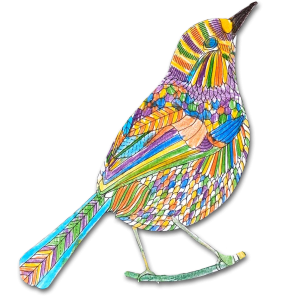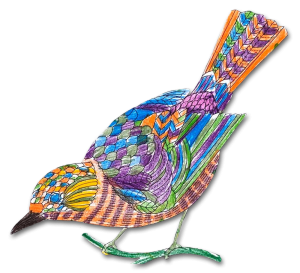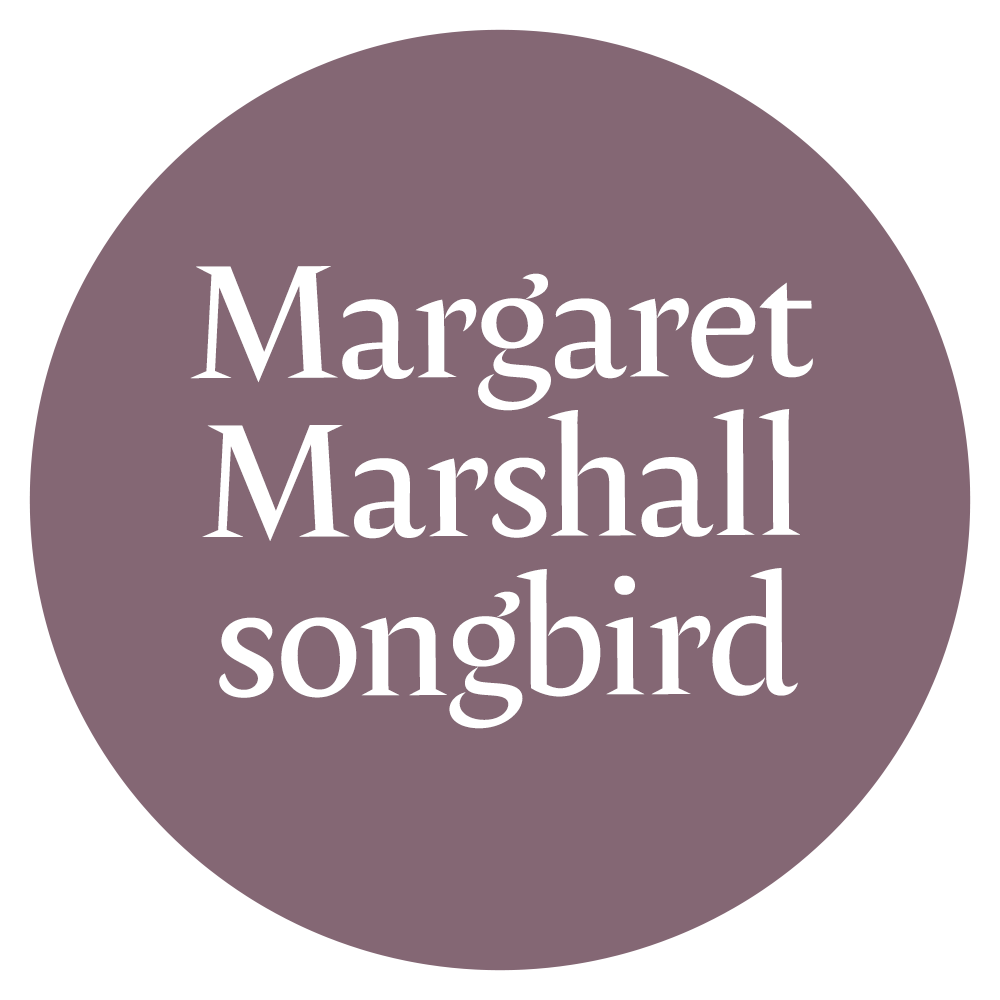Songbird 2
This website was launched in October 2020. Its main feature is the Songbird album, comprising previously unheard performances from early in my career. It has subsequently become available for download on apple and spotify.
I have been extremely touched by the response to the first album. Whether formal reviews, individual emails or comments on social media, it was lovely to know that people took joy from the music.
“The selections reveal Marshall’s multifaceted artistry and showcase the rich purity of her sound and her incomparable mastery of line…[Her] sound is a marvel, rising easily with warmth and focus, and maintaining its fullness even in coloratura passages. Throughout, she exhibits an instrumentalist’s precision and control of legato, staccato and a variety of accents.”
Opera News (Critics Choice)
Readers of the website will know that its creation was more accidental than by design but as is so often the case, once it started the project took on a life of its own.
Having started to track down these earlier performances I kept on the trail and soon uncovered some other interesting gems from the past. Soon I had enough for a second programme and so here we are with the launch of Songbird 2.
The repertoire is very similar to the first Songbird and features the composers I was most associated with during my career, in particular Bach and Mozart. But it also includes the Italian composer Sacchini, whom I suspect few will have heard of, and one of my favourite composers, Hugo Wolf.
Antonio Maria Gasparro Gioacchino Sacchini (I know, it’s a bit of a mouthful)! was born in Florence and raised in Naples where he received his musical education. Best known for his operas, he also wrote other interesting vocal music including the Laudate Pueri Dominum which I performed for a radio broadcast in Cologne in 1976.
I remember the experience very vividly. I had just finished my first commercial recording engagement – which you can read more about [here]. It had been an intense and exhausting experience. Recording the Galuppi Rapida Cerva and J.C Bach Salve Regina [add link], both sizeable solo cantatas, in only two days – with a concert of both works thrown in for good measure at the end of the second day.
The following day I went straight to Cologne for a radio recording of the Sacchini. The Laudate Pueri Dominum is a work for two sopranos, choir and orchestra. I had been invited to sing first soprano. Upon arriving for the first rehearsal I was immediately introduced to the second soprano, a “Miss Poppova.” On reading this you may immediately know to whom I was introduced. I must be honest, perhaps it was the tiredness, but I didn’t! It was only when she started to sing that I immediately realized Miss Poppova was none other than Lucia Popp. My first thought was why was she singing the second soprano – as everyone knows she was an extraordinary Queen of the Night.
The head of the classical music division at WDR3 I assume thought that as I was the younger singer, this would work well. And I have to say upon hearing the performance all these years later, I agree. Our voices blend very well together. I am thrilled to have this recording and that, thanks to WDR, I can include these two short solos in the programme – they are among my favourite pieces in Songbird 2, especially the aria that starts the album, “Excelsus super omnes gentes” – a piece of music I find uplifting and joyous.
Also in my top three would be the Mozart concert aria – Voi avete un cor fedele. My elder granddaughter Maddie loves this piece of music. We have a CD of me singing Mozart concert arias, three of which now feature on Songbird. Voi avete un cor fedele is the first track on the CD and Maddie always loved it. She first heard it when she was about six and it immediately resonated with her. I can’t really say why – neither can she yet. But she always sings along and gets quite frustrated when she can’t go as fast as “dani.” (that’s what she calls me). My elder daughter Nicola (Maddie’s aunt) told her not to be concerned she couldn’t go so fast because I had to learn how to do that. Maddie asked how? Nicola told her I studied with a wonderful teacher, Ena Mitchell. Maddie replied, “She must have given Dani all her talent.” When Nicola told me that, I felt so emotional. Readers of this website will know already how much gratitude to Ena I have always felt. She did indeed always give me all of her talent and more. I love that Maddie was able to express that. I never met anyone like Ena again – she was completely and utterly unique.
And then there is the lieder aspect to the programme. I love all the pieces. In the earlier stages of my career I sang a lot of lieder. When I listen to these pieces now, I wonder why I didn’t continue to prioritize that genre. It was lieder I predominantly studied with Hans Hotter [link] in Munich before I won the 1974 Munich International Competition. It wasn’t a purposeful choice. As a singer you follow the opportunities you are given – and that for me was oratorio and then opera.
But I always loved singing lieder and having access to these performances is a wonderful looking glass into those early days when John and I were young and embarking upon our careers. When I listen to them now, I wonder why we didn’t continue to perform together – he is the most wonderfully talented and natural accompanist. But our careers were taking off in opposite directions – I am extremely fortunately that he remains a dear friend today and indeed an inspiration behind margaretmarshallsongbird.com
Of the lieder with John, while I love all of them, if I have to select one (or two!) I would choose the Wolf songs – Wiegenlied im Sommer and Begegnung.
I love the clarity of Wolf’s writing. He portrays such intense emotion through the conciseness of his composing. His songs are expressive, intimate and full of feeling – all conveyed through the purity of the voice with piano accompaniment.
These two songs both show his immense talent for getting right to the core of the emotion in a very direct and moving manner.
“Wiegenlied im Sommer” is a cradle song – a mother singing a lullaby to her child commenting on the birds, stars, flies and angels who are all enchanted by the child and are saying goodnight. The piano accompaniment rocks back and forth gently, in my mind capturing the rocking cradle.
“Begegnung” – or “meeting” in English – is a fiery passionate song. The piano accompaniment perfectly captures the storms that occurred last night – one of the more traditional type with the wind raging violently, the other between a boy and girl who enjoy a passionate evening before meeting again the morning after on the street. Listen to how the song ends – with the right and left hands of the piano moving apart as the girl swiftly disappears round the corner and out of his view.
I really hope you enjoy the programme. At this point I’m not envisaging a Songbird 3…..but you never know!
Margaret Marshall OBE
Soprano

Songbird 2 Programme
More rediscovered recordingsAntonio Sacchini: Excelsus super omnes, from Laudate Pueri Dominum, WDR 111
Rundfunk Orchester und Chor. Franzjosef Maier conductor in 1976 in the Schlosskirche in Schleiden Germany
J. S. Bach: Weichet nur betrübte Schatten, BWV 202
Saarländisches Orchester conducted by Hans Zender on 19.12.76
Tracklisting:
- Adagio: Weichet nur betrübte Schatten
- Recit: Die Welt wird wieder neu
- Aria: Phoebus eilt mit schnellen Pferden
- Recit: Drum sucht auch Amor sein Vergnügen
- Aria: Wenn die Frühlingslüfte streichen
- Recit: Und dieses ist das Glücke
- Aria: Sich üben in Lieben
- Recit: So sei das Band der keuschen Liebe
- Aria (Gavotte): Sehet in Zufriedenheit
Antonio Sacchini: Sit nomen Domini, from Laudate Pueri Dominum, WDR 111
Rundfunk Orchester und Chor. Franzjosef Maier conductor in 1976 in the Schlosskirche in Schleiden Germany
W A Mozart: Voi avete un cor fedele, K217
Saarländisches Rundfunk Orchester conducted by Günter Kehr on 16.1.76
W A Mozart: Das Veilchen
Accompanied by John Fraser at the BBC studios in 1976
W A Mozart: Als Luise die Briefe
Accompanied by John Fraser at the BBC studios in 1976
W A Mozart: Der Zauberer
Accompanied by John Fraser at the BBC studios in 1976
W A Mozart: Bella mia fiamma, K528
Saarländisches Rundfunk Orchester conducted by Günter Kehr on 25.9.75
Franz Schubert: Suleikas zweiter Gesang
Accompanied by John Fraser at the BBC studios in 1976
Franz Schubert: Das Rosenband
Accompanied by John Fraser at the BBC studios in 1976
Franz Schubert: Ganymed
Accompanied by John Fraser at the BBC studios in 1976
Hugo Wolf: Wiegenlied im Sommer
Accompanied by John Fraser at the BBC studios in 1976
Hugo Wolf: Begegnung
Accompanied by John Fraser at the BBC studios in 1976

